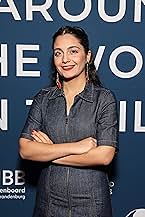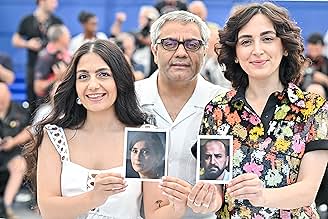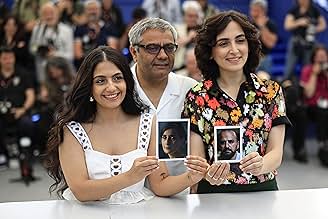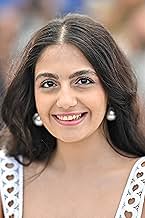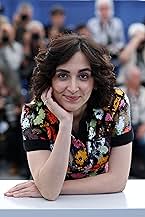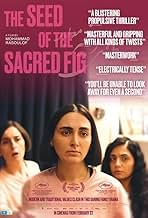An investigating judge struggles with paranoia amid political unrest in Tehran caused by the death of a young woman. When his gun goes missing, he suspects his wife and daughters, imposing h... Read allAn investigating judge struggles with paranoia amid political unrest in Tehran caused by the death of a young woman. When his gun goes missing, he suspects his wife and daughters, imposing harsh measures that fray family ties.An investigating judge struggles with paranoia amid political unrest in Tehran caused by the death of a young woman. When his gun goes missing, he suspects his wife and daughters, imposing harsh measures that fray family ties.
- Nominated for 1 Oscar
- 36 wins & 72 nominations total
- Director
- Writer
- All cast & crew
- Production, box office & more at IMDbPro
Featured reviews
The movie "The Seed of the Sacred Fig" is a political thriller centered on Iman, who is searching for a promotion in Tehran's judicial system. As he ascends in his career, he is torn between personal and professional conflicts, facing moral dilemmas within his family amid the upheaval of the 2022-2023 Iran protests.
The movie is captivating for its portrayal of the clash between an archaic, sexist, and oppressive government driven by religious ideals and the freedom of expression, culture, and modern values embraced by the younger generation. This duality extends into the family dynamic, where personal beliefs collide with political pressures, creating a powerful internal conflict.
Director and writer Mohammad Rasoulof delivers an emotional movie by blending real footage of student protests following the death of Mahsa Amini in 2022.
Another standout achievement is the title The Seed of the Sacred Fig, which perfectly captures and summarizes the essence of the movie. It's a perfect and beautiful choice that sums up the story beautifully.
The movie is captivating for its portrayal of the clash between an archaic, sexist, and oppressive government driven by religious ideals and the freedom of expression, culture, and modern values embraced by the younger generation. This duality extends into the family dynamic, where personal beliefs collide with political pressures, creating a powerful internal conflict.
Director and writer Mohammad Rasoulof delivers an emotional movie by blending real footage of student protests following the death of Mahsa Amini in 2022.
Another standout achievement is the title The Seed of the Sacred Fig, which perfectly captures and summarizes the essence of the movie. It's a perfect and beautiful choice that sums up the story beautifully.
Many of us know about the recent protests in Iran and the tragic death of Mahsa Amini in 2022. The hijab is mandatory in Iran and is enforced by over zealous religious police. Outside of Iran it is hard to understand that something that seems trivial to us is such a big issue.
This film works because it takes us inside a family unit that is impacted by these very issues. It appears to use actual protest footage ( suitably obscured) mixed in along with the fictional actors. This gives it a more urgent edge.
The husband works as an investigator for the regime. One step away from being a judge. He is under severe pressure at work to process huge numbers of religious "crimes" without any due process. He is finding out that the price of his promotion is blind obedience.
He has two daughters. One at high school and the other at university (college.) One of the daughters has a friend who is shot after being in a crowd near a protest. We are told she was an innocent bystander.
The mum of the family is very concerned to protect the family status and reputation which will see them get a bigger apartment to live in. However this won't happen unless all aspects of life are squeaky clean. They can't even tell the daughters what the Dad does because it is a security risk.
In one of the first shots of the movie we see bullets being handed over to the Dad along with a pistol. He is being promoted but needs to be able to protect himself.
What we are seeing is an actual literal Chekhov's Gun in the story. A concept you can look up :)
The pistol disappears from the apartment and the dad must find it or face a possible jail sentence for its loss. This ramps up the tension a few levels and the film then somewhat devolves from then on.
The main impact from the film is to personalise the various political pressures on each member of the family. The best art takes us beyond the headlines to show us what is happening and how that looks and feels in real life.
The story is a fiction but feels like a documentary in many respects. As a film it is a success in helping us to empathise with real people caught up in this kind of terror.
I saw this film at a festival. There were some scenes that were unwatchable and quite emotional.
It is now coming up to the 2 year anniversary of that wave of protests. It wasn't just one person who has died in the protests. Records indicate the number is approaching 500 and the ripple waves of anxiety and stress in families can only be approximated but this film goes a fair way to doing just that.
This film works because it takes us inside a family unit that is impacted by these very issues. It appears to use actual protest footage ( suitably obscured) mixed in along with the fictional actors. This gives it a more urgent edge.
The husband works as an investigator for the regime. One step away from being a judge. He is under severe pressure at work to process huge numbers of religious "crimes" without any due process. He is finding out that the price of his promotion is blind obedience.
He has two daughters. One at high school and the other at university (college.) One of the daughters has a friend who is shot after being in a crowd near a protest. We are told she was an innocent bystander.
The mum of the family is very concerned to protect the family status and reputation which will see them get a bigger apartment to live in. However this won't happen unless all aspects of life are squeaky clean. They can't even tell the daughters what the Dad does because it is a security risk.
In one of the first shots of the movie we see bullets being handed over to the Dad along with a pistol. He is being promoted but needs to be able to protect himself.
What we are seeing is an actual literal Chekhov's Gun in the story. A concept you can look up :)
The pistol disappears from the apartment and the dad must find it or face a possible jail sentence for its loss. This ramps up the tension a few levels and the film then somewhat devolves from then on.
The main impact from the film is to personalise the various political pressures on each member of the family. The best art takes us beyond the headlines to show us what is happening and how that looks and feels in real life.
The story is a fiction but feels like a documentary in many respects. As a film it is a success in helping us to empathise with real people caught up in this kind of terror.
I saw this film at a festival. There were some scenes that were unwatchable and quite emotional.
It is now coming up to the 2 year anniversary of that wave of protests. It wasn't just one person who has died in the protests. Records indicate the number is approaching 500 and the ripple waves of anxiety and stress in families can only be approximated but this film goes a fair way to doing just that.
The Seed of the Sacred Fig was one of the most expected premieres in Cannes due to the backstory of its creation. A film shot in secret in Iran, that led to its director and cast being sentenced to prison and lashing. So, would the movie be able to live up to the expectations despite its complicated production?
What followed was not a film, it was a MOLOTOV COCKTAIL! An incredibly brave, powerful and moving tale of morality, paranoia and resistance. The third act had people talking, but makes perfect sense to me in its symbolic context. If before the movie Rasoulof and his crew already received a big standing ovation due to the film's background, the emotive standing ovation it received after the screening was even more enthusiastic, with the also Iranian director and fellow Palme competitor Ali Abassi encouraging people to stand up and cheer.
The Seed of the Scared Fig did, unfortunately, not win the Palme d'Or in the end, and had to settle for a minor Special Jury Prize. But still, it would have been my choice for the main prize, and won over my and many other people's hearts. Women, Life, Freedom!
What followed was not a film, it was a MOLOTOV COCKTAIL! An incredibly brave, powerful and moving tale of morality, paranoia and resistance. The third act had people talking, but makes perfect sense to me in its symbolic context. If before the movie Rasoulof and his crew already received a big standing ovation due to the film's background, the emotive standing ovation it received after the screening was even more enthusiastic, with the also Iranian director and fellow Palme competitor Ali Abassi encouraging people to stand up and cheer.
The Seed of the Scared Fig did, unfortunately, not win the Palme d'Or in the end, and had to settle for a minor Special Jury Prize. But still, it would have been my choice for the main prize, and won over my and many other people's hearts. Women, Life, Freedom!
The seed of the sacred fig is the first relevant, powerful film about the Iranian rebelion that took place in 2022. The Woman, Life, Freedom's movement was born right after the arrest and death of Jina Mahsa Amini, a student that did nothing but remove her veil. The director takes us down to a family of an Iranian judge (working for the State and the Mollah 's regime) who is about to receive a promotion that is supposed to change his life right at the moment the 2022 revolution starts. We spectators somehow live this key period of Iran through the eyes of this middle class family which is about to upgrade its living conditions. We are emerged in their every day life until the gun of the father (the judge) disapears or gets stolen inside their home.
The film features a fantastic script, wonderful actors and images of an unknown Iran. You can see Iran like we can rarely see it, with its modernity, its rich history and ancient monuments, its poverty as well as its drawbacks. Like in many Iranian films, the spectator is plunged into complex situations with ethical questions which oblige to choose between moral, personal values and loyalty to the regime: Shall I wear this veil or another (less provokative one) ? Should I go the university despite of the strikes ? Shoulld I ask a favor to my neighbor and take the risk of revealing my family's problems? The ethical questions are everywehre, and they are direct consequences of the heavy oppressive regime that has ruled Iran for now decades. All these questions are faced with dignity and sense of duty by the characters , with sometimes even loyalty towards a regime who could not care less about its people. Through these situations are revealed the lack of freedom, the oprression over women, the complicity of those who take profit of this regime and of course the brutality of a regime condemned to sacrifice its own people in order to survive.
The latter will be perfectly depicted through the fate of the father willing to do his job respectfully but obliged to corrupt himself and sacrifice his people in order to survive to this revolution no matter how painful it is.
I particularly enjoyed the insight into the Iranian middle class. Being able to see and imagine what is an every day life for women in Iran is difficult to figure from the Western World. The more the film lenghts the better it gets as you can clearly see the impasse into which the country has plunged, and with it its inhabitants (and in this case this family) condemned to find a guilty among them.
Little by little, we can spot the seeds of discord germinating in this family, into the society, among students, and throughout the world thanks to social networks. That's the other revelation of this film. Social network is the key; that's the tool through which the song Baraye resonates, as well as images of police violence are spread, proofs of the oppression are accumulated, they are the hopes of Iran. The regime can no longer hide behind outrageous lies, the seeds of rebellion are now spread everywhere and the complice of the regime can no longer hide.
A promising outcry and a promising motto for the future Iranian society: Woman, Life, Freedom that we hope, will eventually change Iran for good.
The film features a fantastic script, wonderful actors and images of an unknown Iran. You can see Iran like we can rarely see it, with its modernity, its rich history and ancient monuments, its poverty as well as its drawbacks. Like in many Iranian films, the spectator is plunged into complex situations with ethical questions which oblige to choose between moral, personal values and loyalty to the regime: Shall I wear this veil or another (less provokative one) ? Should I go the university despite of the strikes ? Shoulld I ask a favor to my neighbor and take the risk of revealing my family's problems? The ethical questions are everywehre, and they are direct consequences of the heavy oppressive regime that has ruled Iran for now decades. All these questions are faced with dignity and sense of duty by the characters , with sometimes even loyalty towards a regime who could not care less about its people. Through these situations are revealed the lack of freedom, the oprression over women, the complicity of those who take profit of this regime and of course the brutality of a regime condemned to sacrifice its own people in order to survive.
The latter will be perfectly depicted through the fate of the father willing to do his job respectfully but obliged to corrupt himself and sacrifice his people in order to survive to this revolution no matter how painful it is.
I particularly enjoyed the insight into the Iranian middle class. Being able to see and imagine what is an every day life for women in Iran is difficult to figure from the Western World. The more the film lenghts the better it gets as you can clearly see the impasse into which the country has plunged, and with it its inhabitants (and in this case this family) condemned to find a guilty among them.
Little by little, we can spot the seeds of discord germinating in this family, into the society, among students, and throughout the world thanks to social networks. That's the other revelation of this film. Social network is the key; that's the tool through which the song Baraye resonates, as well as images of police violence are spread, proofs of the oppression are accumulated, they are the hopes of Iran. The regime can no longer hide behind outrageous lies, the seeds of rebellion are now spread everywhere and the complice of the regime can no longer hide.
A promising outcry and a promising motto for the future Iranian society: Woman, Life, Freedom that we hope, will eventually change Iran for good.
A provocative & politically charged drama that also serves as a scathing critique of oppressive rule through the devastating account of a family's unraveling, The Seed of the Sacred Fig is an increasingly incendiary story that takes its time to acquaint us with the family dynamics before seeds of paranoia & mistrust take root in the household and turn the whole thing into a familial nightmare.
Written, co-produced & directed by Mohammad Rasoulof, the main incident that sets the plot into motion takes place over an hour into the picture but in that time, it does familiarise us with the volatile situation & civil unrest taking place outside the house that complicates things a lot more within the household. Rasoulof is patient in his approach and provides ample space for the characters to breathe.
The first half covers the clash in ideology & perspective that unfolds between the ladies of the house over the real-world riots & protests taking place outside their apartment, the footage of which is interspersed within the narrative. The film is expertly shot but the narration is rather clunky and only held together by strong performances from the cast. The runtime is also often felt, and the final act overstays its welcome.
Overall, The Seed of the Sacred Fig is a bold, brave & audacious effort from Rasoulof who risks his own life & puts everything on the line to deliver a scorching indictment that's timely & urgent in more ways than one. The slow-burn pace makes the length all the more daunting despite the premise being interesting on paper and the film as a whole needed to be more tightly-knitted to make its powerful message heard with thunderous clarity.
Written, co-produced & directed by Mohammad Rasoulof, the main incident that sets the plot into motion takes place over an hour into the picture but in that time, it does familiarise us with the volatile situation & civil unrest taking place outside the house that complicates things a lot more within the household. Rasoulof is patient in his approach and provides ample space for the characters to breathe.
The first half covers the clash in ideology & perspective that unfolds between the ladies of the house over the real-world riots & protests taking place outside their apartment, the footage of which is interspersed within the narrative. The film is expertly shot but the narration is rather clunky and only held together by strong performances from the cast. The runtime is also often felt, and the final act overstays its welcome.
Overall, The Seed of the Sacred Fig is a bold, brave & audacious effort from Rasoulof who risks his own life & puts everything on the line to deliver a scorching indictment that's timely & urgent in more ways than one. The slow-burn pace makes the length all the more daunting despite the premise being interesting on paper and the film as a whole needed to be more tightly-knitted to make its powerful message heard with thunderous clarity.
Did you know
- TriviaDirector Mohammad Rasoulof was originally scheduled to take part in the 2023 Cannes Film Festival as a jury member of the Un Certain Regard section. However, he was arrested in July 2022 after criticising the government's crackdown on protestors in the southwestern city of Abadan in Iran over deadly building collapse. On May 8, 2024, Rasouloff's lawyer announced that he has been sentenced to eight years in prison as well as flogging, a fine and confiscation of his property. On May 12, 2024, Rasouloff announced that he managed to flee Iran and was staying at an undisclosed location in Europe. On May 24, 2024, Rasouloff attended the film's premiere in Cannes and on the red carpet he held up photos of two of the film's actors, Soheila Golestani and Missagh Zareh.
- Crazy creditsOpening credits: "Ficus Religiosa is a tree with an unusual life cycle. It seeds, contained in bird droppings, fall on other trees. Aerial roots spring up and grow down to the floor. Then, the branches wrap around the host tree and strangle it. Finally, the sacred fig stands on its own."
- ConnectionsFeatured in 82nd Golden Globe Awards (2025)
Details
- Release date
- Countries of origin
- Language
- Also known as
- The Seed of the Sacred Fig
- Filming locations
- Production companies
- See more company credits at IMDbPro
Box office
- Gross US & Canada
- $860,139
- Opening weekend US & Canada
- $35,230
- Dec 1, 2024
- Gross worldwide
- $6,586,600
- Runtime2 hours 47 minutes
- Color
- Sound mix
- Aspect ratio
- 2.35 : 1
Contribute to this page
Suggest an edit or add missing content

Top Gap
What is the Canadian French language plot outline for Les Graines du figuier sauvage (2024)?
Answer


